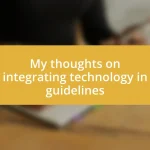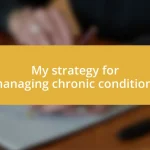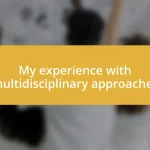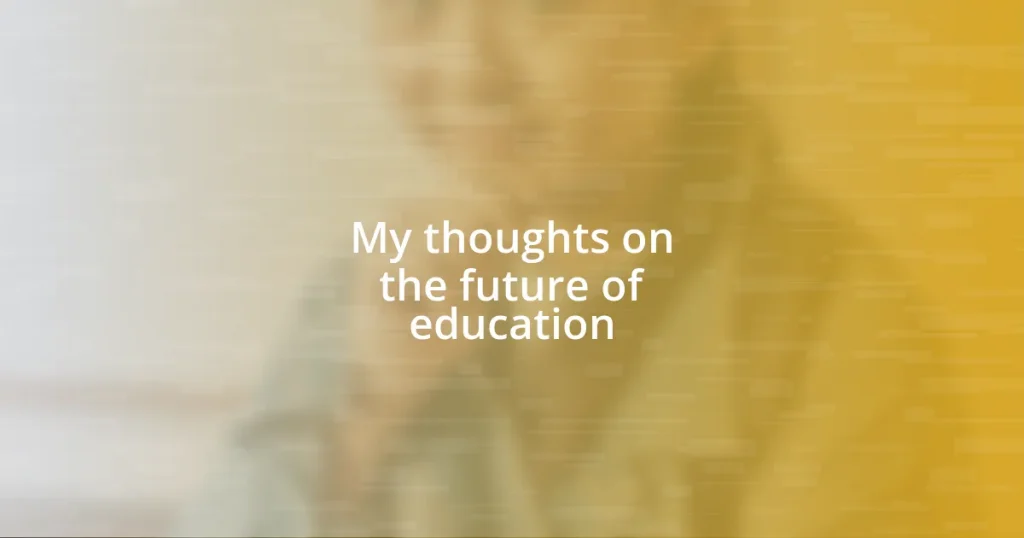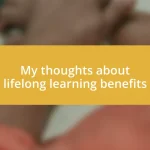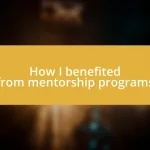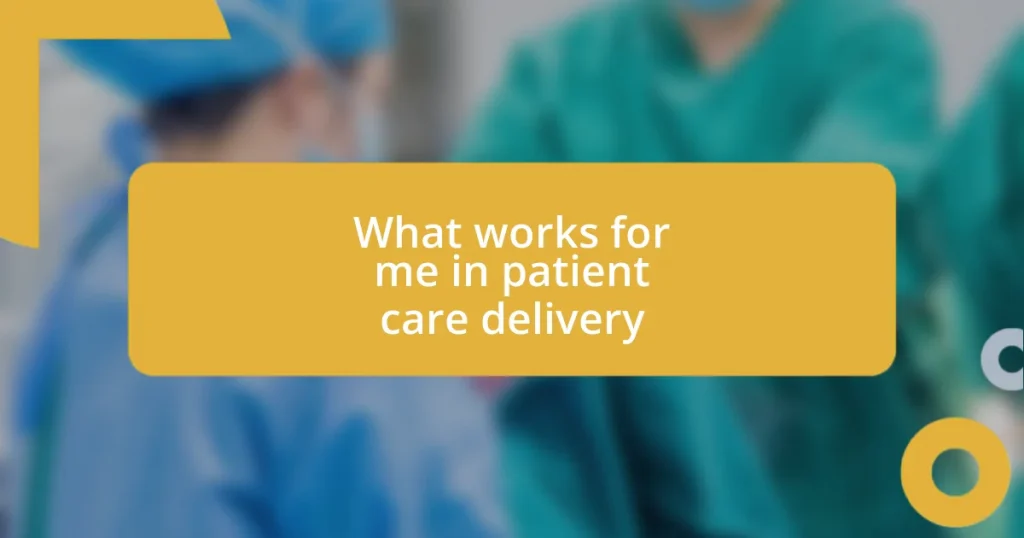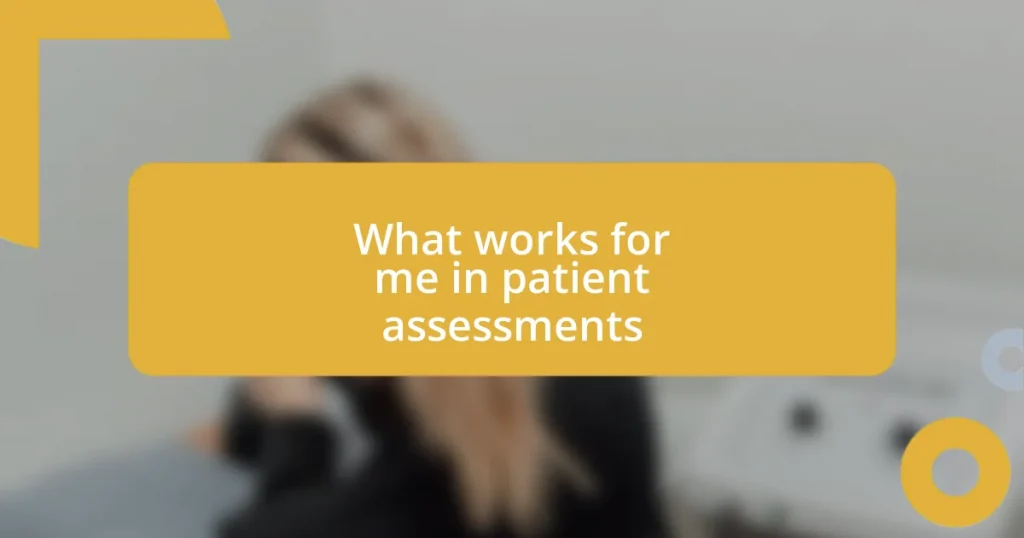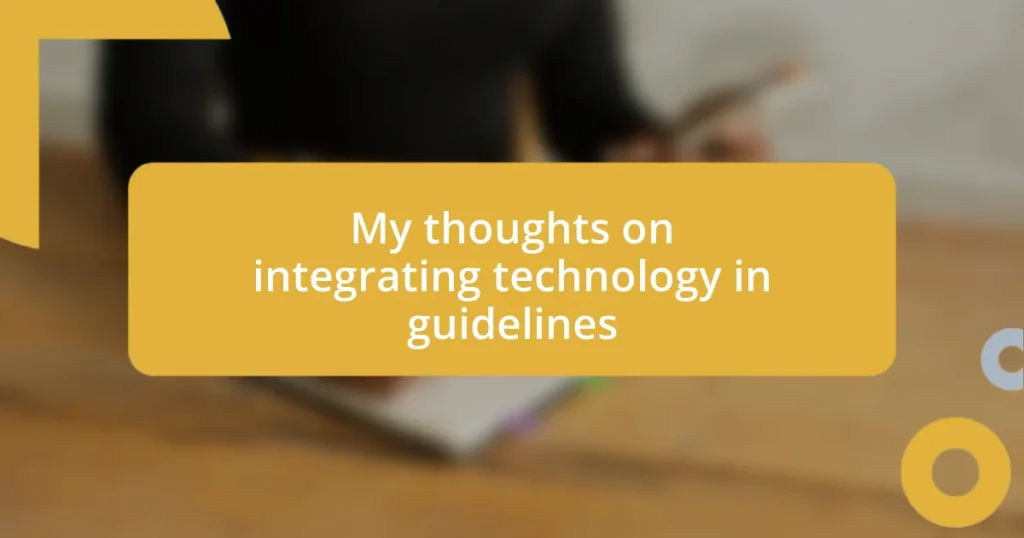Key takeaways:
- Technology enables personalized and adaptive learning, enhancing student engagement and support.
- The role of teachers is shifting towards mentorship, fostering critical thinking and emotional intelligence in students.
- Lifelong learning is essential for career adaptability and personal growth in a rapidly changing world.
- Global educational disparities highlight the need for equitable access to resources and quality education for all children.

Future education trends to watch
One trend that really excites me is the rise of personalized learning through technology. I remember a time when I just couldn’t grasp a math concept in class, feeling frustrated and alone. Now, with adaptive learning platforms that tailor content to each student’s pace, imagine how many learners won’t have to face that struggle anymore. Isn’t it fascinating how tech can create a more supportive learning environment?
Another powerful trend is the integration of emotional intelligence into curricula. I’ve seen firsthand how understanding our emotions can drastically improve student participation and well-being. When we equip students with these skills, we’re not just teaching them about facts and figures; we’re preparing them for the complexities of life and work. Could this be the key to fostering more compassionate leaders in the future?
We also can’t overlook the increasing emphasis on lifelong learning. I’ve come to realize that education doesn’t end with a diploma—it’s a continuous journey. As industries evolve and new skills emerge, the ability to adapt through ongoing education will be crucial. How often have you felt the need to upskill to stay relevant? This mindset shift may redefine not just individual careers, but entire economies as well.

Impact of technology on learning
Technology’s impact on learning has been nothing short of transformative. I vividly recall my first experience with an online course. It was an eye-opener, allowing me to learn at my own pace, revisit complex topics, and even connect with peers around the globe. This flexibility goes beyond traditional classrooms, making education more accessible and tailored to individual needs. Isn’t it remarkable how technology can break down geographical and socioeconomic barriers?
Moreover, let’s not overlook how technology fosters engagement through gamification. I was skeptical at first, thinking how could a game motivate serious learning? However, after trying out a learning app that employed game mechanics, I found myself thoroughly engaged. It’s a world where tests feel less like exams and more like exciting challenges. This change in perspective can instill a love for learning in students who might otherwise disengage.
There’s also the role of data analytics in assessing learning outcomes. In my experience, I’ve seen educators utilize insights from platforms to identify student strengths and weaknesses quickly. This tool empowers teachers to make informed decisions, ensuring that every student gets the support they need. With the right data, personalized strategies can be implemented effectively, making every learner’s journey unique.
| Technology Impact | Traditional Learning |
|---|---|
| Personalized Learning | One-size-fits-all approach |
| Gamification | Standard assessments |
| Data Analytics | Generalized teaching methods |

Role of teachers in education
The role of teachers is evolving, and I find it both challenging and exhilarating. They aren’t just knowledge dispensers anymore; they’re becoming facilitators of learning, guiding students on their own educational paths. I remember a high school teacher who encouraged us to explore topics beyond the textbook. That sparked a love for discovery in me, showing how a teacher’s support can truly ignite curiosity and passion.
- Teachers foster critical thinking by encouraging questioning and exploration.
- They build connections with students, creating a safe space for discussions.
- Their adaptability allows them to meet diverse learning needs in the classroom.
- Teachers also play a vital role in instilling values, not just academic knowledge.
- They continuously learn and grow, modeling lifelong learning for their students.
In today’s world, teachers also take on the role of mentors. I often reflect on how my favorite teacher tackled not only academics but also our personal challenges. She would listen, providing guidance that extended far beyond school walls. This mentorship aspect is crucial as students navigate both their educational and emotional journeys. The way teachers engage with their students can shape their lives in profound ways.

Importance of lifelong learning
The notion of lifelong learning resonates deeply with me, as it reflects an essential mindset in today’s fast-paced world. I remember attending a workshop well into my career, where the speaker emphasized the importance of staying curious and open to new ideas. It struck me that learning doesn’t stop after formal education; instead, it’s a continuous journey that enriches both our personal and professional lives. How can we truly grow if we confine ourselves to what we learned years ago?
Engaging in lifelong learning allows us to adapt and evolve, especially as industries change around us. I once transitioned from one career path to another, and it was my commitment to learning that equipped me with the necessary skills to thrive in a completely new environment. The feelings of uncertainty were daunting, but I found empowerment in acquiring knowledge from online courses and networking with peers. Isn’t it liberating to know that we can reinvent ourselves at any stage of life?
Furthermore, I’ve observed that lifelong learning nurtures not just knowledge but also resilience. Embracing the idea that we are always students fosters an attitude of humility and growth. I often reflect on challenging projects I’ve undertaken, where setbacks taught me invaluable lessons. These experiences not only shaped my capabilities but also reinforced my belief that our potential is limitless when we remain dedicated to learning. Wouldn’t you agree that every obstacle can be a stepping stone to greater wisdom?

Strategies for personalized education
Personalized education is all about recognizing individual student needs and strengths. One strategy I’ve seen in action is the use of adaptive learning technologies. For example, in a recent discussion with a college friend who teaches math, she shared how a program adjusts the difficulty of problems based on each student’s performance. This not only keeps students engaged but also builds their confidence as they master concepts at their own pace. Doesn’t it feel more rewarding to learn when it aligns with your unique rhythm?
Another effective approach I’ve come across is project-based learning. I recall a workshop where we crafted a project around a topic of our choice. This process made learning feel alive and relevant, as we connected theoretical knowledge with real-world applications. I noticed how my peers lit up when discussing their projects, highlighting their passions and skills. Isn’t it fascinating how personalization isn’t just about learning styles, but also about igniting interests and creativity?
Finally, incorporating student voice into the curriculum can significantly boost motivation. I remember collaborating with classmates to voice our preferences regarding weekly topics, which empowered us to influence our learning environment. This strategy encouraged ownership over our education and fostered a sense of community. Have you ever felt more engaged in a situation where you had a say in what you were learning? It’s a powerful reminder that education can be a partnership, not just a transaction.

Global educational disparities to address
Global educational disparities are a pressing issue that cannot be ignored. When I think back to my own education, I realize how fortunate I was to have access to resources like textbooks and technology, unlike many students in underprivileged regions. It’s heartbreaking to know that millions of children worldwide still lack basic educational tools. Don’t you feel that every child deserves the same chance to learn and grow, regardless of where they live?
Moreover, the disparities extend beyond just access to materials; there’s also a significant quality gap in education. I vividly remember a teacher who inspired me with her passion and creativity. In contrast, many students today may be stuck in overcrowded classrooms with underqualified teachers. This situation often results in disillusionment and disengagement. How can we expect students to thrive when they don’t have the guidance and support they need to explore their potential?
Finally, technology offers a glimmer of hope in bridging these gaps. I often reflect on the online courses that transformed my understanding of various subjects. Imagine if students in remote areas could harness the power of the internet to connect with quality educators worldwide. It’s an exciting thought, but it requires a concerted effort to ensure that everyone has Internet access. Isn’t it remarkable to consider how equitable access to technology could reshape the future of education for so many?

Preparing students for the future
Preparing students for the future requires more than traditional teaching methods; it involves cultivating critical thinking and adaptability. I remember a group project in high school where we had to solve a real-life problem within our community. The experience taught us not only to engage with complex issues but also how to collaborate with each other, which is a vital skill in today’s workforce. Have you ever found clarity in collaboration?
Another aspect is integrating technology into everyday learning. I once attended a seminar where a speaker showcased how students could use virtual reality for immersive learning experiences. The enthusiasm in the room was palpable as people shared how this technology could bring history or science to life. Isn’t it exciting to think how such tools could enhance comprehension and retention?
Finally, fostering emotional intelligence is increasingly important. During my college years, I trained as a peer mentor, and I saw firsthand the impact of empathy and understanding in education. When students feel supported emotionally, they’re more resilient and motivated to face challenges. Don’t you think that education should focus not just on intellect but on nurturing the whole person?


